Roughly 100 days into his second term in the White House, Trump’s job approval rating has declined across a range of demographic and partisan groups. Trump does not currently draw confidence from a majority of Americans for his handling of any major issue, while his rating on the economy is at its lowest point in surveys dating back to 2019.
More Americans say that, compared with the Biden administration, the Trump administration’s policies have made the U.S. economy weaker (49%) rather than stronger (37%). Another 13% say there is not much difference.
More also say Trump’s policies put the U.S. in a weaker position internationally (49%) rather than a stronger position (39%).
Trump’s job approval
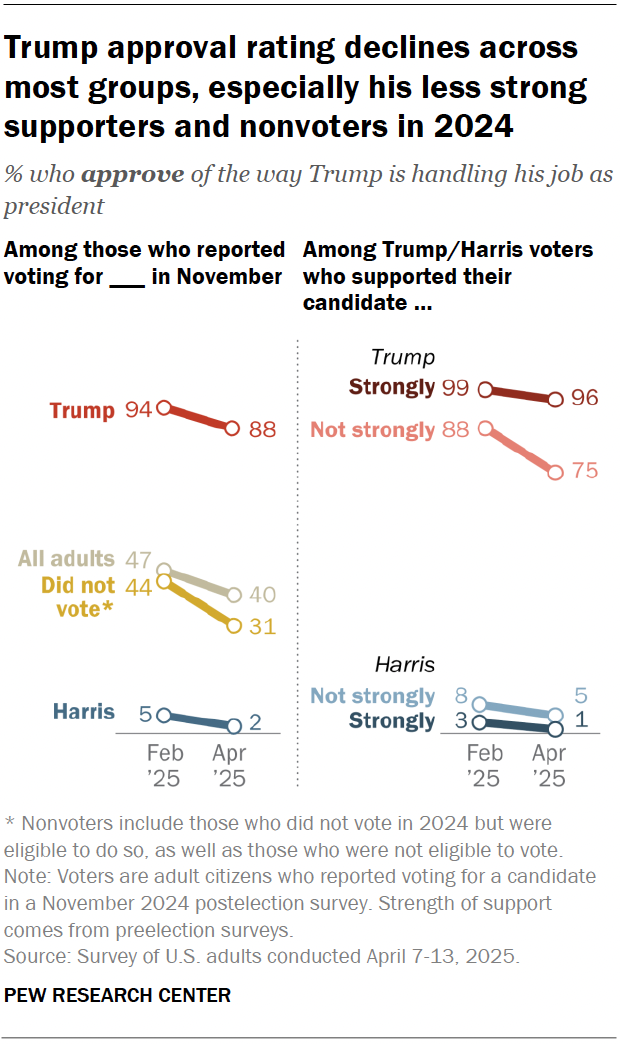
Trump’s approval rating has fallen 7 percentage points since February. Today, 40% of Americans approve, compared with 47% two months ago.
The president’s rating has declined among most subgroups, but the drop is slightly more pronounced among his less enthusiastic supporters in last fall’s election – as well as among 2024 nonvoters.
Trump’s 2024 voters
- In February, 94% of those who reported voting for Trump in 2024 approved of the way he was handling his job. This has declined to 88% today.
- Among those who said they supported him strongly in the 2024 election, 96% approve of the job he is doing as president – similar to views two months ago (99%).
- The decline is sharper among Trump voters who said they supported him less strongly in 2024, or leaned toward supporting him before eventually doing so (88% in February vs. 75% today).
Harris’ 2024 voters
- Trump’s job rating remains very low among those who said they voted for Kamala Harris last fall. Just 2% of these voters approve of his job performance.
2024 nonvoters
- Views of Trump’s job performance also dropped among those who did not vote in 2024. In February, 44% of nonvoters approved. Today, 31% of nonvoters approve – a 13-point decline.
Trump’s job approval among demographic groups
Today, 40% of U.S. adults approve of the way Trump is handling his job as president, including 31% who strongly approve. Nearly six-in-ten disapprove, including 48% who do so strongly.
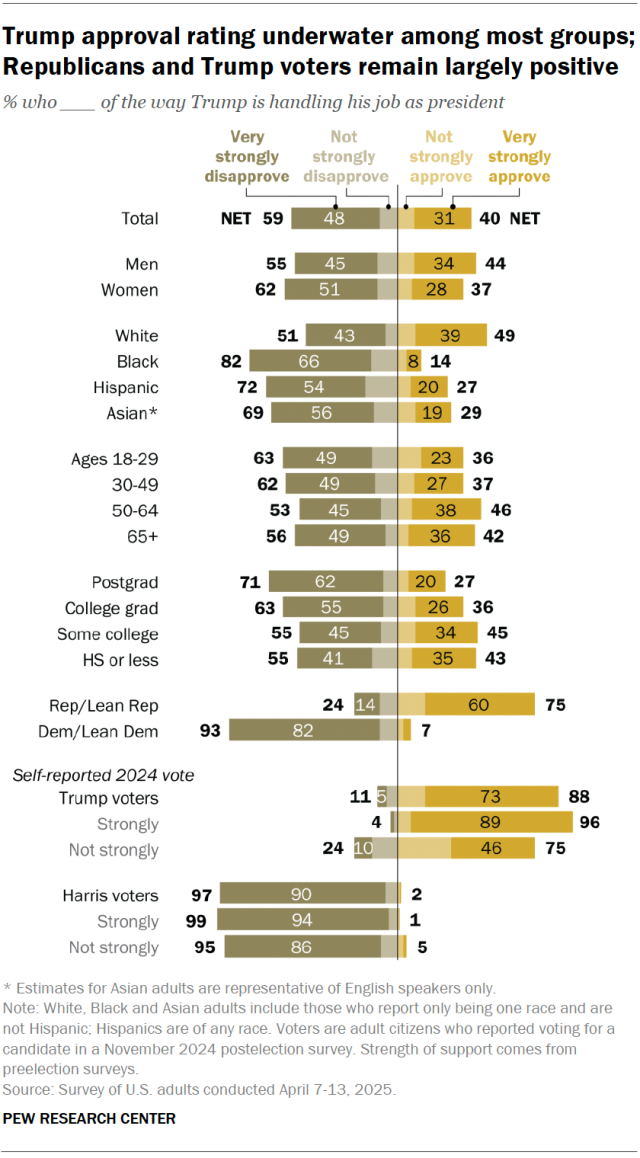
Trump’s rating has dropped 7 points among adults overall, and most subgroups have seen a similarly sized decline.
Ratings among Asian Americans have fallen more sharply than those of most other groups: While nearly half of Asian adults approved of Trump in February (47%), that share has dropped to 29% today. (Estimates for Asian adults are representative of English speakers only.)
Views of Trump’s ability to handle key issues
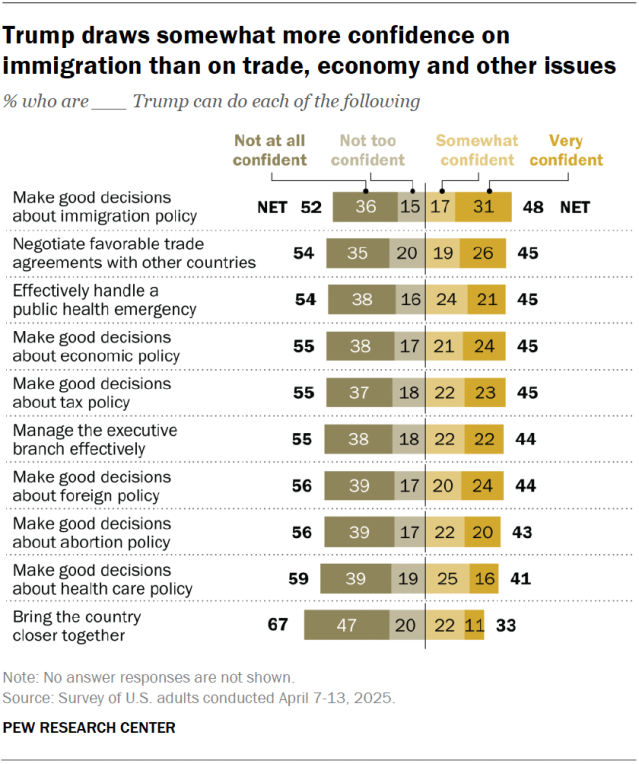
Today, fewer than half of Americans express confidence in Trump to handle most issues – ranging from trade to foreign policy to abortion.
Across all 10 issues asked about on the survey, adults are more likely to say they have little or no confidence in Trump than to say they are very or somewhat confident in him.
The public is slightly more confident in his ability to make good decisions about immigration (48% are very or somewhat confident) than they are on his handling of trade (45%), a potential public health emergency (45%) and a variety of other issues.
As was the case in previous surveys, adults are far less confident in Trump’s ability to unify the nation. Two-thirds of adults are not confident he can bring the country closer together.
Wide partisan gaps in confidence
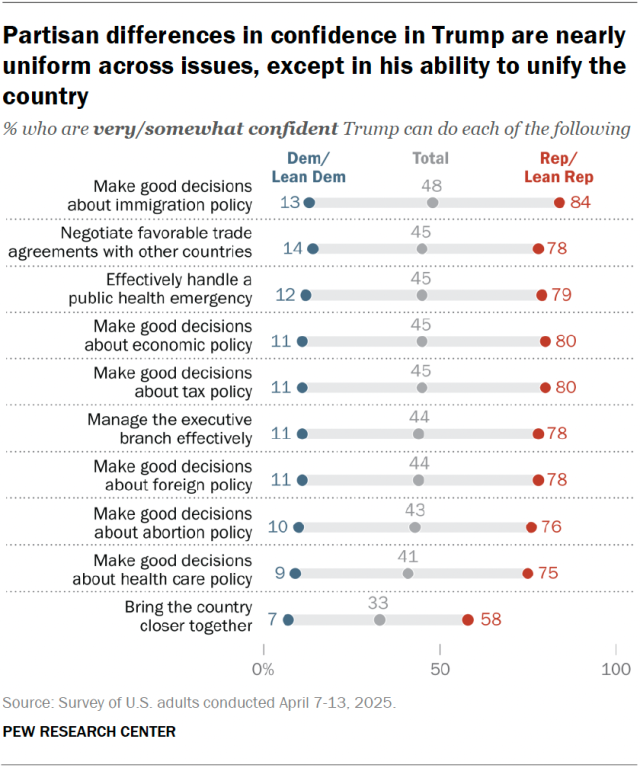
There continue to be wide partisan gaps in confidence in Trump’s ability to handle a variety of issues.
Among Republicans
- Sizable majorities of Republicans are at least somewhat confident Trump can handle each of the issues in the survey, including immigration, trade, economic policy and foreign policy.
- They are particularly confident he can make good decisions about immigration (84%).
- They are significantly less confident he can bring the country closer together (58%).
Among Democrats
- Democrats broadly lack confidence in Trump. About one-in-ten express confidence in him on each issue asked about.
Confidence in Trump to handle issues over time
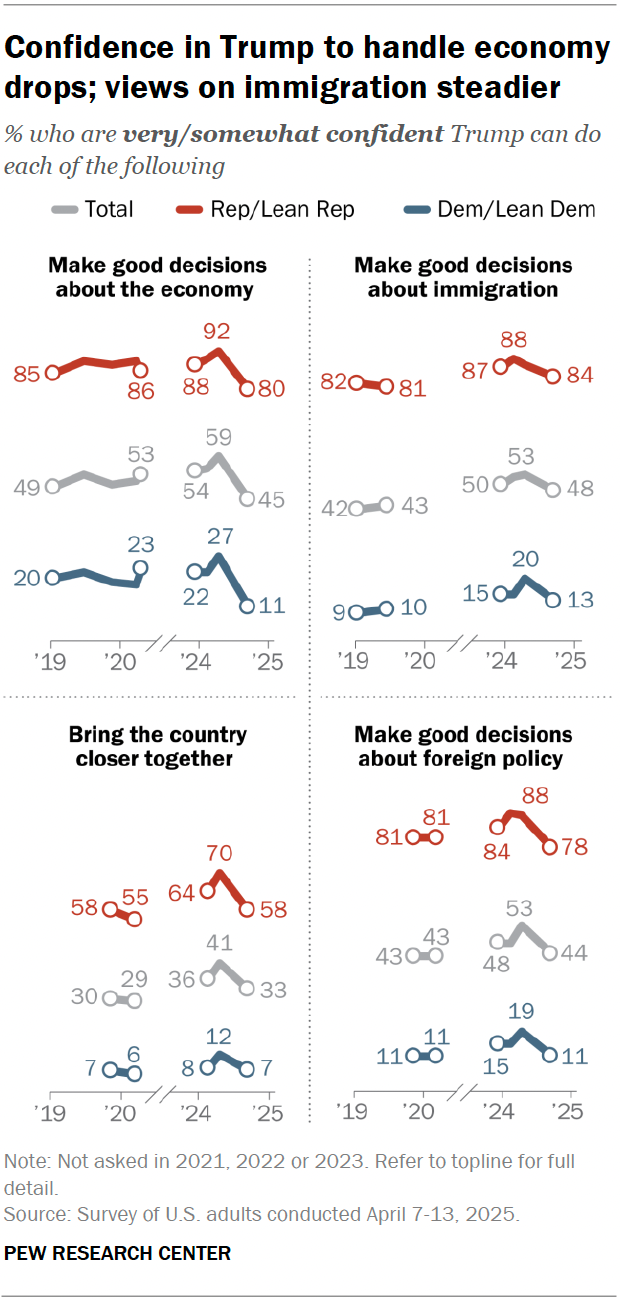
Across several key issues, confidence in Trump has declined since November – just after his 2024 election victory.
Confidence in Trump’s handling of immigration continues to be higher than in his first term, while his foreign policy ratings are on par with his first term. But when it comes to the economy, Trump draws less confidence today than he did either in his first term or during the 2024 campaign.
Confidence in Trump on the economy
The economy has long been an area of relative strength for Trump. During his 2020 and 2024 presidential campaigns, Americans expressed more confidence in Trump’s ability to handle the economy than they did in either Biden or Harris.
Last summer, 54% of adults said they were very or somewhat confident in Trump to make good economic decisions. That number rose to 59% in Pew Research Center’s postelection survey in November. Today, 45% are confident in his ability to handle the economy – down 14 points from a few months ago and lower than throughout 2019 and 2020, during his first term.
Confidence among partisans
- Among Republicans, the share expressing confidence in Trump’s handling of the economy is down 12 points since November.
- Among Democrats, there has been a 16- point drop in that time.
How does Trump compare with Biden on economic confidence?
The share expressing confidence in Trump on the economy is still higher than the share who expressed confidence in Biden for much of his term. Confidence was highest for Biden shortly after he took office in 2021. In March of that year, 56% of Americans said they were at least somewhat confident Biden could make good decisions about the economy. These ratings declined steadily throughout his term – particularly in 2022 – before reaching a low of 36% in December 2023.
How Trump’s administration stacks up against Biden’s on economic, international policy
Economic policy
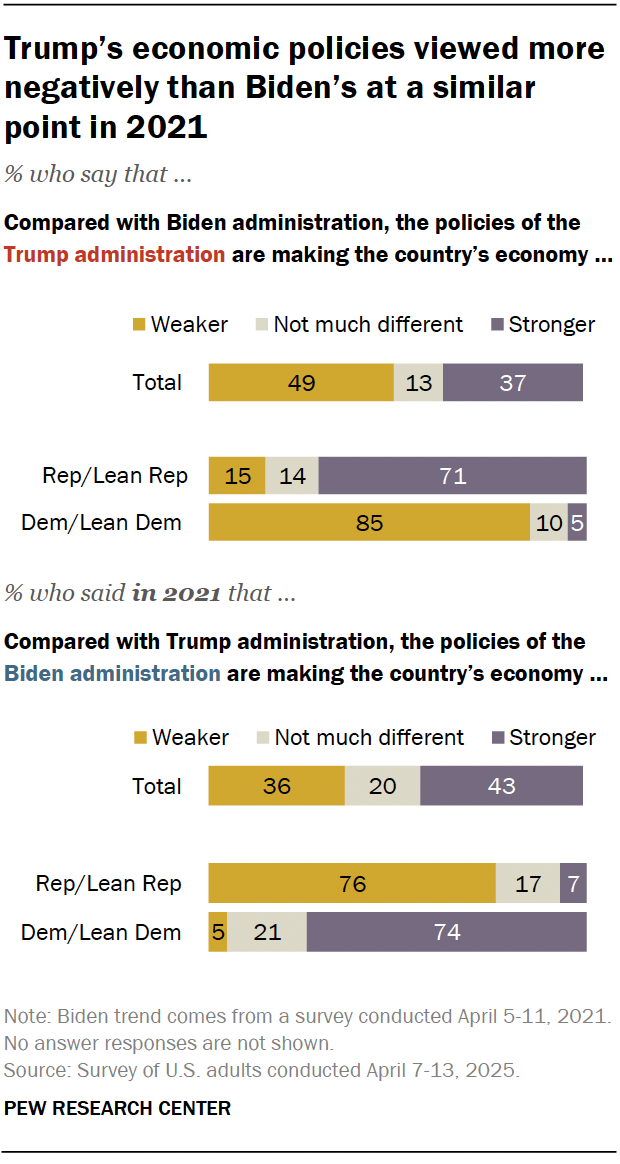
Today, 49% of Americans say that, compared with the Biden administration, the policies of the Trump administration are making the country’s economy weaker. A smaller share (37%) says they are making the country stronger, and 13% say there is not much difference.
At a similar point in Biden’s presidency four years ago – when his overall standing with the public was at its highest point – more said Biden’s policies were making the economy stronger compared with Trump’s policies (43%) than said they were making it weaker (36%). Two-in-ten said there was not much difference.
Views among partisans
- Republicans are more likely to say Trump’s policies are making the nation’s economy stronger (71%) than weaker (15%) compared with Biden’s policies.
- Democrats’ views are essentially the reverse: 85% say Trump’s policies are weakening the economy compared with Biden’s policies, while 5% say they’re making it stronger.
International policy
Half of the public says that, compared with the Biden administration, the policies of the Trump administration are putting the U.S. in a weaker position internationally. A smaller share says his policies are strengthening the country’s standing (38%) while 11% say they leave the U.S. in about the same position.
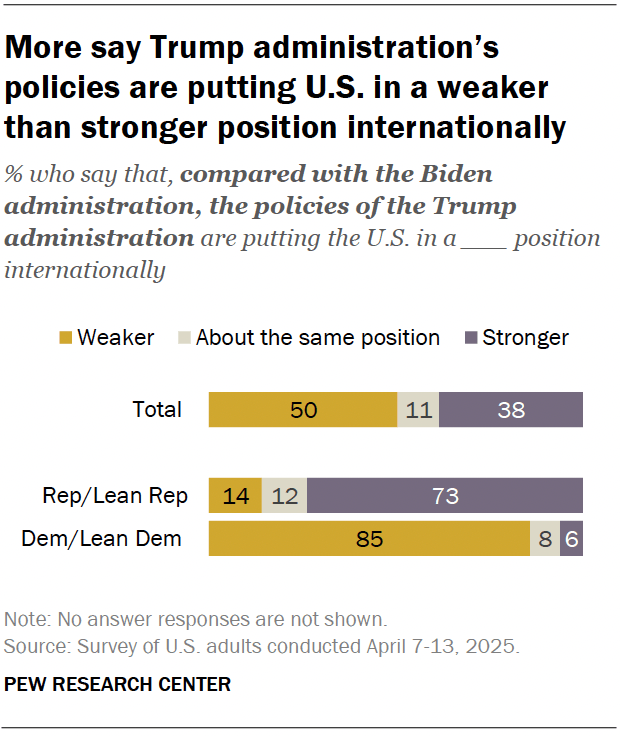
- Republicans are far more likely to say Trump is putting the U.S. in a stronger (73%) rather than weaker (14%) position internationally.
- Democrats are far more likely to say his policies are weakening (85%) rather than strengthening (6%) the country’s global standing.
Roughly 100 days into Trump’s first term in 2017, a similar share said that, compared with the Obama administration, the Trump administration was putting the U.S. in a weaker position internationally (45% in 2017 vs. 50% today). A smaller share said these policies were strengthening the country’s standing (31% in 2017 vs. 38% today).




